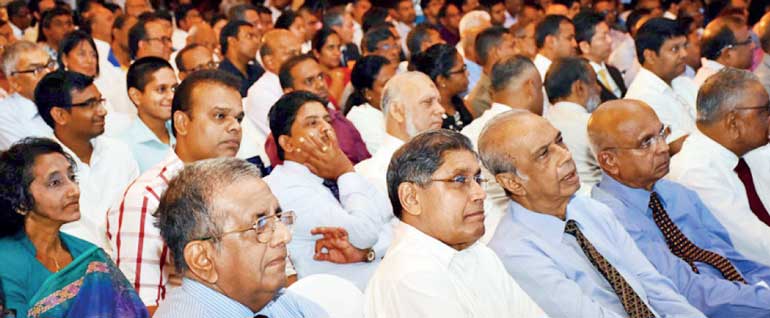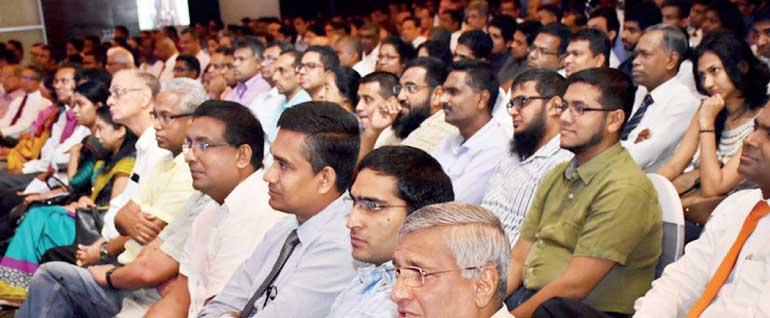Friday Feb 20, 2026
Friday Feb 20, 2026
Monday, 23 November 2015 00:00 - - {{hitsCtrl.values.hits}}

By Shehana Dain
With the very first unitary Government Budget presented last week, KPMG in Sri Lanka on Saturday hosted a conference themed ‘2016 Budget Analysis’, which saw the attendance of a plethora of industry heads and entrepreneurs.
The final segment of the event was a panel discussion in which industry personalities were given an opportunity to voice their opinions and concerns.
The panel consisted of Minister of Finance Ravi Karunanayake, CBSL Deputy Governor Nandalal Weerasinghe, IRD Commissioner General Kalyani Dahanayake, Ceylon Chamber of Commerce Samantha Ranathunga, NDB Director and CEO Rajendra Theagarajah, Hayleys Group Senior Economist Deshal De Mel, KPMG Sri Lanka Head of Tax Shamila Jayasekara and KPMG Sri Lanka Principal Tax and Regulatory Suresh Perera. The session was moderated by KPMG Sri Lanka Managing Partner Riyaz Mihular.
“One of the longstanding issues in Sri Lanka was fiscal awareness. This mainly comes from revenue to GDP ratios coming down, which led all the expenditure to primarily come from borrowings rather than revenue,” said Deputy Governor Weerasinghe.
Weerasinghe noted that there were strong proposals that addressed this issue which would pull back the revenue to GDP ratio from about 13% to 16% overall and tax revenues from 11.4% to 12.4 % this year.
“As a result we are going to see a revenue surplus, which means large amounts of public investments can be made by revenue rather than recurrence expenditure.”
He added: “Another important factor from the macro side is that public investment will be a record high in this Budget which is almost 7% from the GDP. That means that the main focus will be on education and continuous development of infrastructure. This year we had an issue where public investment was lower than previous years but now it’s going to come back to a healthy level.”
From a monetary policy perspective, the Government’s continuous dependency on loans from the banking sector was a heavily debated issue. According to Weerasinghe, in this Budget Government borrowing from banks was going to be considerably lower, dropping from Rs. 390 billion million to Rs. 182 billion, which will give the private sector more exposure to the resources of the banks. “The Government will borrow more from foreign sources which means large amounts of external borrowings are going to be concessionary or commercial foreign funding. That is good for our balance of payment. For many years we tried to fund the balance of payments using our reserves,” Weerasinghe said.
The Budget also communicates that by the end of June reserves would increase to Rs. 10 billion which the CBSL expects to come from both foreign borrowing and the private sector. Ceylon Chamber of Commerce Chairman Samantha Ranathunga welcomed the new Budget while noting that the collective wish lists of the chambers were met by it.
“We had many rounds of engagement and we put out a wish list which basically meant to create a better investment environment. Each and every point had been touched as a very forward thinking and development-oriented Budget.”
He also commended the Government’s move to make the Lankan agriculture scene more profitable by involving the private sector. “If you take agriculture, basically we are moving from a subsidised industry to an agriculture value added industry where the private sector has openings.
The tax regimes and reforms will encourage us as the private sector has not been involved in agriculture for the past decade or so,” he said.
“In the field of SMEs, which has been a forgotten child again by means of bringing a centralised authority, a centralised reforms system then a credit guarantees scheme and again a legislation system for SMEs is extremely important,” he added. Inland Revenue Commissioner General Kalyani Dahanayake stressed that the Budget streamlined economic policies as well as financial discipline, which would bring the IRD more revenue.
“The concession given in the income tax section will result in viable economic situations in all aspects, so we hope people at all levels will be financially disciplined. The administration aspect with the technological system RAMIS which we will adapt will simplify things and bring us more results,” she said.
NDB Director/CEO Rajendra Theagarajah welcomed the much talked about expat remittance move by the Government. However, he noted that things had to be met in the process to make the move a success.
“If a non-Sri Lankan brings in money, in the IRD form we request them to declare his or her assets. We ask for their income so why should we ask them information about their assets? We should look into abolishing these measures to make the foreigners feel more comfortable,” he highlighted.
Theagarajah mooted the Budget’s directive to increase the income tax threshold to Rs. 2.4 million and impose a simplified rate of 15%.
“For the emerging middle class it’s a good opportunity and also for the banks. This increases spending power. While it encourages a common citizen, from a banking viewpoint it encourages them to engage more in personal banking,» he stated.
‘On par with Singapore, Malaysia and India’
The Budget also addresses a key point in the capital market side, where it withdrew stamp duty for share certificates and abolished the share transaction levy.
“Hopefully now Sri Lanka can be on par with Singapore, Malaysia and India,” commented Theagarajah.
Furthermore, he spoke on the much disputed topic where banks were barred from leasing activities and taken by surprise during the Budget presentation.
“I’m not sure how the implementation will take place, where banks will be able to offer loans or do the same business for subsidiaries. My only comment to the minister there is where is the focus? Is it to enhance and strengthen the finance companies by doing this or is it to strengthen the SMEs. If we are to strengthen SMEs the lease product is also an integral part to strengthen the SMEs, not the vehicles also the equipment,” he said.
“Banks have huge opportunity to play an increased role in PPP and infrastructure now, but I don’t think the fragmented industry today can play the role. This needs a nudging as voluntarism won’t work,” he noted.
Hayleys Plc Chief Economist Deshal De Mel noted that in terms of giving direction to the economic structure and reform agenda the Budget had taken positive action, moving on from the Premier’s economic vision laid out on 5 November.
He noted that the Budget’s directive to invest in education was a good move particularly in teacher training to encourage innovation as it would ultimately assist the private sector.
Moreover, Mel highlighted that the listing of state-owned enterprises such as the Hilton, Hyatt and Telco firms was a positive step.
According to him the digitisation of the economy would facilitate the ease of doing business.
“Digitisation of the economy is going to simplify many things; like applications and getting things approved. Again this ties up with getting investment approved in a short period. So I think it’s going to be a very big investment but also a worthwhile one,” he said.
However, Mel stressed that the revenue targets set in the Budget were rather ambitious. “In 2016 we are looking at Government revenue increasing by 38.5%.
Now that is very substantial. It will be fantastic if we can pull it off but I’m cautious because in 2013 we had 7% growth, in 2014 5% and this year we are expecting about 17% in revenue growth. In the first five months we had Rs. 70 billion growth in revenue but about Rs.54 billion of that was from excise duty on motor vehicles and the balance was from excise duty on liquor and tobacco. The growth in imports of motor vehicles next year is debatable,” he opined.
According to him this could lead to fiscal slippage which could have an impact in interest rates in 2016 as well.

